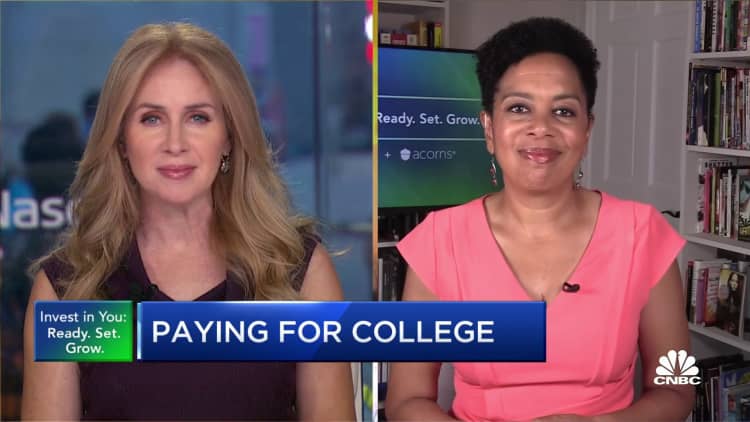Parents may be stunned by a slide in the value of their college savings accounts. The average 529 plan balance has shrunk by thousands of dollars in less than six months.
The average 529 savings plan account held $25,395 at the end of December but was estimated to have fallen to $21,016 by June 17, according to data compiled for CNBC by ISS Market Intelligence.
Conservative, age-based portfolios also slide
For students about to enter or already in college, age-based portfolios have also lost significant value. They're designed to shift to more conservative assets — from stocks to bonds — as the first year of college approaches, but that hasn't helped them hold steady.
More from Invest in You:
Student loan forgiveness could narrow racial wealth gap
Do this with 529 college savings plan if student debt's forgiven
Here's how to get the most money towards college
"Right now, there's really no place to hide — and that means not even in bonds," said certified financial planner Stacy Francis, founder of Francis Financial in New York. "We looked at long-term bonds, and they're down 20%.
"Short-term bonds are down, as well," she added. "So even those age-based accounts where individuals are looking to start college in the next year or two might be down 5% to 10%."
I Bonds for college savings
Yet there are bonds worth considering for college savings. Series I Savings Bonds may be a viable alternative to 529 plans, some financial advisors say.
The rate of return, pegged to inflation, is pretty hard to beat — with an initial rate of 9.62% through this October. And, that rate is good for six months after you buy the bonds.
"Because it's making so much interest, and it's guaranteed by the federal government, that is one of our safest best investments right now," said CFP Stephanie Lee, founder of East Rock Financial Services in San Francisco.
Parents, children can own I bonds
You can own an I bond as long as you have a Social Security number. Parents can buy up to $10,000 a year of I bonds for themselves and each of their children on the U.S. Department of the Treasury's website at TreasuryDirect.gov. Open an account for your child that is linked to your own account to buy I bonds for them.
You can also buy up to $5,000 in paper I bonds using your federal income tax refund. So you could purchase up to $15,000 per person in a calendar year.
The drawbacks of an I bond
There are some drawbacks. You can't cash them in for 12 months and then, if you cash an I bond before it is five years old, you will lose the last three months of interest.
So if your child is close to college age, I bonds may not be the wisest investments because of the stipulations on investments, Lee said.
"I would not invest that money thinking that oh, in three years, it'll be more and I can pay for college," she said. "I would pay with the cash you have and keep cash for the next three to five years of expenses."
Merits of 529 plans
Still, most financial planners say 529 plans are still savings options for those with children still many years away from entering college.
"For those individuals who have toddlers, elementary school, even middle schoolers, this is actually an amazing opportunity for you to put money into your 529 plan, be able to essentially buy stocks and bonds on sale, and have that grow beautifully for the future," Francis said.
If you invested in a 529 plan before December 2020, you're still ahead, said Lee. "It's been a big drop, of course ... but you're still ahead."







